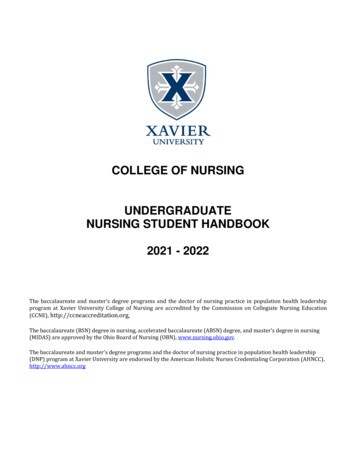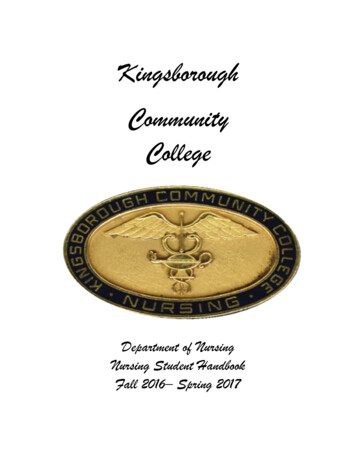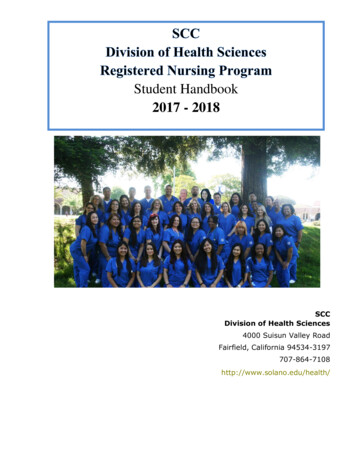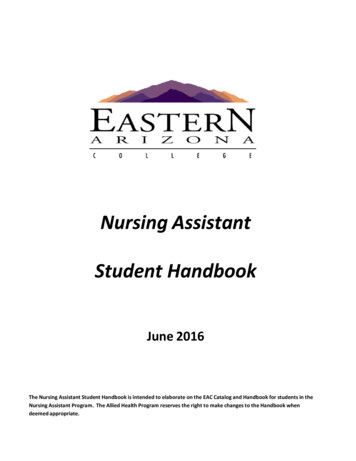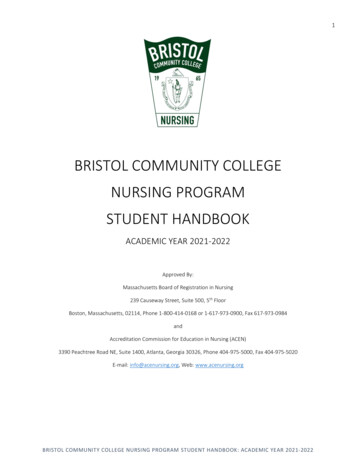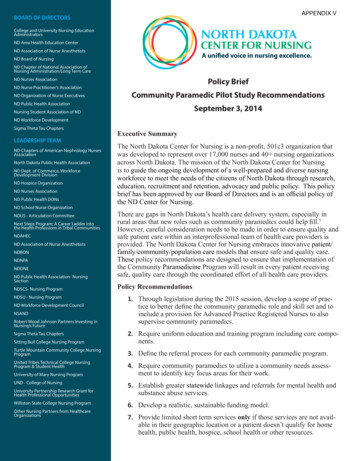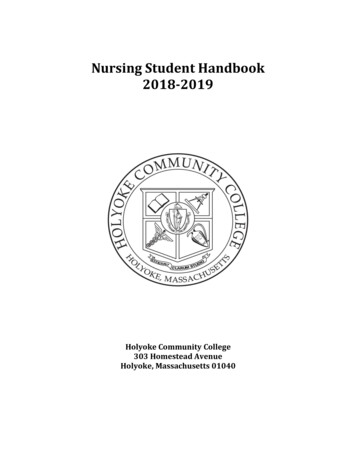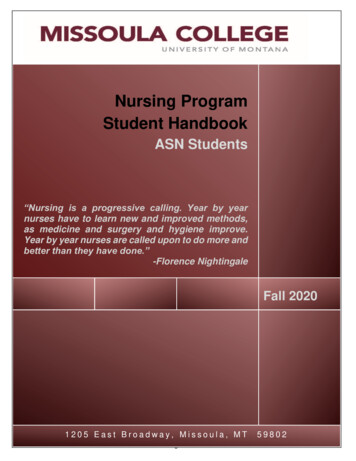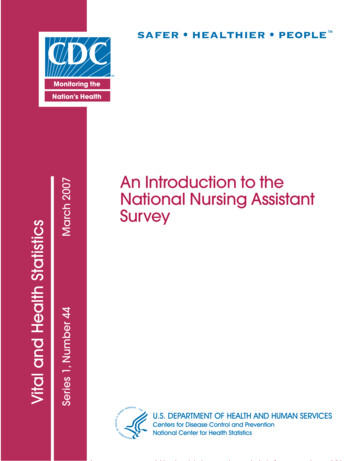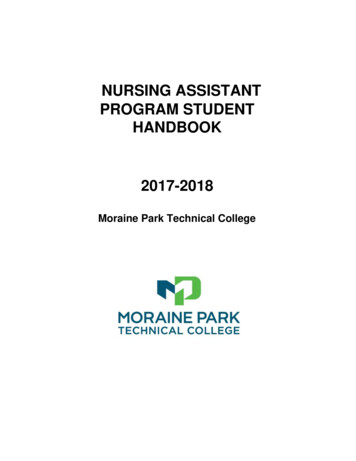
Transcription
NURSING ASSISTANTPROGRAM STUDENTHANDBOOK2017-2018Moraine Park Technical College
Moraine Park Technical College Nursing Assistant Program2017-2018 Student HandbookThe Nursing Assistant Program at Moraine Park Technical College reserves the right to initiatechanges in the program as deemed necessary to maintain quality nursing education. Policychanges or exceptions are made only after Nursing Assistant Program review. Changes arecommunicated to students through updates in the Nursing Assistant Program StudentHandbook.The Nursing Assistant Program Student Handbook includes policies that are program specific.Students are also accountable for policies included in the MPTC Student Handbook and theMPTC Catalog. MPTC policies regarding Grievance Process, Title IX, Affirmative Action andEqual Opportunity, are written in the MPTC Student Handbook for student reference andinformation.As a student in the Nursing Assistant Program at MPTC, I have read and understand that I amresponsible for knowing and following the contents of the most current Nursing AssistantProgram Student Handbook. I understand that information contained in the handbook is subjectto change and that I am responsible for adhering to policies in the handbook. A current copy ofthe Nursing Assistant Program Student Handbook is located on myMPTC and in CANVAS.Program and course information will be communicated to students via myMPTC and MorainePark Technical College student e-mail. IT IS IMPORTANT TO ACCESS YOUR MPTC studentE-MAIL and myMPTC FREQUENTLY.2
Moraine Park Technical College Core Abilities and IndicatorsMPTC and the Nursing Assistant Faculty have identified seven essential skills that are key to anindividual’s success in the Nursing Assistant Program and in the workforce. As you progressthrough the program students develop these core abilities and they are responsible for theirapplication in the clinical environment. The core abilities and indicators include:Works Productively You stay on task, managing time effectivelyYou ask for assistance when neededYou strive for continuous improvement in your workYou prioritize work to meet deadlinesYou seek learning experiencesAdapts to Change You adhere to infection control standardsYou transfer learning from the classroom to the clinical settingYou modify thoughts and actions as situations changeYou approach change calmly and rationallyYou anticipate changes coming to, or affecting the situationCommunicates Clearly You model professionalism and etiquette in all communications (letters, e-mail, voicemail, texting, etc.)You participate in discussions modeling active listening and feedback skillsYou plan and organize communications according to the purpose and audienceWorks Cooperatively You respect othersYou encourage and offer assistance to team membersYou complete assigned taskDemonstrates Integrity You accept and provide feedback to further individual growthYou demonstrate trustworthiness by being honest, dependable, confidential andreliableYou maintain a professional image in your work and appearanceYou are accountable for your actions3
Acts Responsibility You follow directions and suggestions for improvementYou follow safety proceduresYou meet deadlinesYou maintain residents’ rights, this includes but is not limited to keeping all cellphones out of the classroom, lab and clinical environmentsYou attend class as scheduledThink Critically and Creatively You are able to problem solve, prioritize and be flexibleYou are creative in exploring possible solutionsStudent Progress PolicyStudent progress is monitored frequently by faculty. A student progress memo (See AppendixA) is used to communicate a concern to the student. This does not mean that a student will beunsuccessful in the course; instead, it is a vehicle to communicate a concern and to identify howthe student may improve and become successful in the course.Faculty initiate the student progress memo and then notify and meet with the student. Thememo is completed and the plan for success is documented. A copy is given to the student andone is placed in the student’s folder. Areas of concern may also be communicated to theassociate dean, accommodation specialists, and other staff as appropriate. Thiscommunication will allow staff members to assist the student in meeting the requirements andresolving the areas of concern.Unsuccessful remediation of the concern identified in the Student Progress Memo may result inthe student not passing the Nursing Assistant Course.Nursing Assistant Student Competencies1.Communicate effectively with members of the healthcare team.2.Adhere to the ethical and legal responsibilities of the NA/HHA.3.Demonstrate behavior that supports and promotes client rights.4.Communicate with clients, family and visitors demonstrating awareness of emotional,social, culture and mental health during interaction.5.Maintain a safe environment for clients and caregivers.6.Apply personal safety measures.7.Apply principles of medical asepsis, infection control measures, and prevention ofblood borne infections.8.Perform personal care and hygiene skills.9.Assist with elimination needs.10.Assist with nutrition and fluid needs.11.Measure vital signs, identifying deviations from normal.12.Utilize principles of mobility and techniques to assist with movement of clients.13.Promote client comfort and vital functions.14.Promote independence through rehabilitation and restorative care.15.Provide care appropriate for clients experiencing dementias.16.Care for the dying person and family.17.Describe the role of the HHA.4
You must demonstrate mastery of all of the competencies in this course in order to successfullycomplete the courseFunctional Abilities StatementPrior to the first day of class, you will be given the Functional Abilities form for you to review.This can also be viewed in Canvas.Nursing Assistant ProgramFUNCTIONAL ABILITY CRITERIAThe Nursing Assistant Program is highly regulated by state and federal law. OBRA, 1987 andState of WI, HFS 129, 2009 offer specific criteria for how the program will be run, what is taught,how it is taught, mandated hours needed to be completed, and ability of the nurse aide to do thework required. Also, it is the intent of Moraine Park Technical College (MPTC) to fully complywith Section 504 of the Rehabilitation Act of 1974, and the Americans with Disabilities Act (ADA)of 1990 and, the ADA Amendment Act of 2008. (In accordance with the ADA and Section 504,MPTC does not provide students with personal devices and services.)In order to assist students successfully complete the Nursing Assistant Program and achievecertification to work through the State of Wisconsin Caregiver Program, MPTC has developed aset of objective functional ability criteria.Students will be asked to sign a form stating whether or not they are able to meet the functionalabilities, with or without accommodations, as stated in this document. If a student enters theNursing Assistant Program based on falsification of records related to his/her ability tomeet functional requirements, he/she may face disciplinary actions. All signed forms willbe kept on file at MPTC for three years, and then destroyed.For students with a disability reasonable accommodations are available. Reasonableaccommodations are defined as modifications or adjustments that allow individuals withdisabilities to gain equal access and have equal opportunities to participate in MPTC’s courses,services, activities and use of the facilities. To be eligible for disability-relatedservices/accommodations, students must have a documented disability. This documentationmust be provided by a licensed professional, qualified in the appropriate specialty area. MPTCis not obligated to provide an accommodation that requires a substantial change in thecurriculum or alteration of an essential element or functions of a program/course. The Collegeis also not obligated to provide an accommodation that poses an undue financial oradministrative burden to the College or poses a direct threat to the health and /or safety ofothers.In accordance with ADA and Section 504 requirements, special accommodation requestsrequire the approval of the nurse aide training program chair, the disabilities specialistand the DHS Office of Caregiver Quality. All requests for special accommodations mustbe approved before a student has enrolled in the programAccommodations Allowed, Without Disability Documentation: supportive brace or othersupportive brace that does not impede required movement or interfere with infection controlpolicies, hearing aids, glasses, and/or contacts.5
It is required that you meet with an Accommodation Specialist at least 3 weeks prior to start ofthe course so that an accommodation plan can be made.The following is a list of functional abilities the students must have in order to participate in theNursing Assistant Program at Moraine Park Technical College.GROSS MOTOR SKILLSAbility to move in confined spaces, maintain balance in standing position, move body from oneside to the other, reach below the waist and to the front or the side of the body to the level ofthe top of head (examples: adjust overhead lights, plug electrical appliance into wall outlet)Ability to push, pull, stabilize, and freely move arms to allow movement of 50 pounds as inmoving an object or transferring a client from one place to anotherFINE MOTOR SKILLSAbility to grasp, twist, squeeze, pinch, and manipulate fine equipment for at least 5 seconds(example: operate fire extinguishers)TACTILE ABILITYAbility to distinguish subtle vibrations through the skin (pulse)Ability to identify the subtle difference in surface characteristics (feel a raised rash)Ability to detect temperature (skin, liquids, environment)MOBILITYAbility to squat or modified squat (one knee on the floor) for at least one minuteAbility to move quickly in case of emergency situationsAbility to climb and descend a flight of stairsAbility to walk independently without the assistance of cane, walker, crutches, wheel-chair or theassistance of another personENVIRONMENT & PHYSICAL ENDURANCEAbility to have stamina sufficient to maintain physical activity for a period of time from 5-8 hoursAbility to tolerate exposure to common allergens such as: pets, body lotions and soaps,cleaning products Student must inform Nursing Assistant Program Instructor in advance of class toassess if a pet resides in the clinical environment, attempts will be made to placestudents in a clinical site without a petAbility to tolerate working in confined areasAbility to tolerate heat and humidity as high as 90 degrees for up to ½ hour (shower and sparooms)SPEECH AND COMMUNICATIONAbility to interact with others to report observations and advocate for the needs of clients.Ability to speak, write and understand English in order to be able to communicate with clients aswell as report and document client information.6
SENSES: SMELL, HEARING AND VISIONAbility to detect differences in body and environmental odorsAbility to hear and understand voices spoken at a normal speaking volume at a distance of 10feet (typical length of a room) (example: person to person conversation)Ability to hear faint noises such as whispers with a range of 4 feet (considered the typicalcomfort zone)Ability to see objects clearly within a minimum of 20 feetAbility to have depth perception and peripheral vision to allow identification of dangerous objectsand client situations within the client roomAbility to read and interpret written data held at a reasonable distanceEMOTIONAL STABILITYAbility to interact and support clients during times of stress and emotional upsetAbility to adapt to changing situations and emergency conditions while maintaining emotionalcontrolAbility to cope with strong emotions and physical outbursts of clients while remaining in areasonable state of calmAbility to focus attention on client needs despite interruptions and multiple demandsAbility to accept constructive feedback and accept responsibility for own actions.INTERPERSONAL SKILLSAbility to apply knowledge gained in classroom to establish appropriate relationships withclients, families and coworkersAbility to interact as a member of the healthcare teamAbility to show respect for diversity in culture, religion, sexual orientation, marital status, socioeconomic status and abilities/disabilitiesREADINGAbility to read and understand at a minimum of a 8th grade level with ability to understandcharts, graphs and worksheetsAbility to read and understand digital and computer displays.MATHAbility to do basic math including add, subtract, multiply, and divide without the use of acalculatorAbility to count and understand the meaning of numbersAbility to measure length by reading a tape measure or rulerAbility to tell time on a clock7
Student InsuranceAll students enrolled in classes or in clinical/practicum will automatically be enrolled in and billedfor the Wisconsin Technical Colleges Mandatory Accident Only Insurance Plan. The Plan offerscomprehensive benefits when an accident occurs while on campus, at a clinical/practicum siteor during travel to and from a clinical/practicum site. Please note Moraine Park does notassume any responsibility for personal injuries or property damage on campus or at any offsiteclinical arrangement. Each student’s participation in a class is strictly voluntary, and it isstrongly encouraged that all students carry their own medical and property insurance. Refer tomyMPTC/Student tab/Student Resources/Accident Insurance links for additional information.Accident ReportingIf an injury/incident occurs on school property, an incident report must be completed within24 hours with the assistance of school personnel. If an injury/incident occurs at a clinical site,an incident report must be completed and submitted for both the clinical site and Moraine Park.Please work with clinical and college coordinators to complete appropriate paperwork in a timelymanner.Nursing Assistant Student Attendance PolicyAttendance is mandatory and important to ensure compliance with DHFS 129 requirementsfor training.Hours:42.000 lecture hours (includes 16 hours independent study: videos).32.500 lab hours45.500 clinical hoursTotal: 120 hoursIn the event of an emergency or severe illness that prevents you from attending class, pleasedo the following;1. As soon as possible, notify instructor. If you cannot complete the class due to an injuryor severe illness we will need specific documentation (i.e. MD Note). MPTC will thensend a letter to the state to ask for approval for an extension. MPTC will try and makeevery effort to accommodate the request if possible.2. If lab class is missed, it is your responsibility to obtain notes from another student. Youare also responsible for attending open lab time and completing all the on-line activitiesfor the Learning Plans that you missed. You will be given a form that outlines themakeup activities and verifies you have made up the hours you missed. You will alsohave to arrange a time with your instructor to demonstrate the skills that you missed.You have one week to complete the makeup work.3. If a unit test is missed, speak with instructor about how this will be made up. This mustbe made up before the next exam.4. If clinical class is missed you will be required to make up this time. Your instructor willdetermine if the missed time is an excused absence and if so, will arrange an alternativeclinical makeup time.8
Clinical Make Up:1. 45.5 hours minimum clinical experience with satisfactory evaluation2. Clinical make up will be determined by your instructor, clinical agencyacceptance and availability, and criminal background check. If this criteria is notsuccessfully met, the student will be unsuccessful in the course and required towithdraw from the course.On Campus classes:Maximum amount of make-up time allowed is 8 hours. Any time over this will result in thestudent being dropped from the course. Depending on the date of withdrawal, you may ormay not be eligible for a refund.Accelerated classes: Maximum amount of make-up time allowed is 8 hours. Any time overthis will result in the student being dropped from the course. Make-up work for lab: You will beresponsible for attending open lab and completing the form as stated above. Your instructorwill give you the time frame of when to complete this. Make-up work for clinical: You will berequired to make this time up. Please see above. Your instructor will give you the time frame ofwhen to complete this.All missed time must be made up and must not be over 8 hours.Student Pregnancy Risk Management PolicyMPTC is committed to ensuring equal opportunity for all students regardless of sex, includingstudents experiencing pregnancy and childbirth. Accommodation Specialists are available tocoordinate accommodation plans, for students who are pregnant or who have recentlyexperienced childbirth, have post pregnancy needs, or related medical restrictions. Pregnantstudents are encouraged to work closely with the Accommodation Specialist. It is theresponsibility of the pregnant student to initiate requests for accommodation and to helparrange specific accommodations.Students admitted to the Nursing Assistant Program are at greater risk for exposure to certainmaterials or incidents that may result in injury. Some of these exposures could potentially affectpregnant women or their unborn child. Possible exposures may include: needle stick exposure,chemical exposure, infectious agents and other illness.Students who are pregnant should:1. Consult with their individual instructors regarding the types of hazards to which thestudent may be exposed in the class in which she is enrolled or in which she isexpecting to enroll in the future.2. Contact their treating physician as soon as possible to obtain recommendations for aplan to minimize exposure to hazards with the possibility of reproductive effects whichthey may be exposed.3. If accommodations, work restrictions, or class schedule changes are recommended,contact the Accommodation Specialist as early as possible to assist in developing anaccommodation plan in accordance with the physician’s recommendations. The studentwill be asked to provide a copy of the specific restrictions or accommodationsrecommended by her treating physician to the Accommodation Specialist.Student Accommodation Specialist will discuss with the student possible accommodationsbased upon student’s individual needs.9
If a student is unable to complete her clinical experience the following needs to be done:1. Student needs to provide documentation from her physician on her limitations.2. Instructor will provide this information to the Nursing Assistant Program Director who willsend it to the state Nursing Assistant Consultant to request an extension.Student will receive an incomplete until she finishes her clinical experience.MPTC does not discriminate against students on the basis of sex or pregnancy. MPTCrecognizes that it is the right of the pregnant student to make decisions concerning thepregnancy. At the same time, the pregnant student is expected to complete each requirementof the curriculum by a schedule or plan that can reasonably be implemented and under whichrisks are deemed acceptable by the student and her physician. Student and her physician areresponsible to determine risk levels of participation in educational activities within the NursingAssistant Program, based upon the student’s health condition and any known risk factors.MPTC makes no representations as to whether risks of harm to the pregnant student and/orunborn child are acceptable.MPTC does not control decisions of affiliate clinical agency partners of clinical placements.Accommodation Specialist in Disability ResourcesAccommodation Specialist, Beaver Dam campus 920-887-4495 or 1-800-472-4554Accommodation Specialist, Fond du Lac campus 920-924-3196 or 1-800-472-4554Accommodation Specialist, West Bend campus 262-335-5741 or 1-800-472-4554 TTY/VP: UseRelay/VRSIf you have a documented physical or learning disability that may affect your performance in thisclass or clinical, please contact a Learning Specialist for help prior to the start of class locatedon each campus It is your responsibility to voluntarily and confidentially disclose informationregarding the nature and extent of your disability to our trained Learning Specialists who willwrite an accommodations plan based on your needs. Accommodations may include, but are notlimited to test readers, note takers, extended test time and help with test preparation. You mustbe able to meet the competencies of the course in theory and lab. For the safety of students andresidents, you must demonstrate competence in skills before being allowed to participate inclinical.10
Health RequirementsAll required health records must be completed and turned in on the date determined by yourinstructor. Failure to provide all required health records will result in inability to continue with theclass, and you will need to withdraw from the course.Grading InformationThe following are the assessment tasks in this course:The grade for this course is based on the following;1.2.3.4.30% of the final grade average of 3 unit tests40% of final grade clinical20% of final grade lab10% of final grade comprehensive examTo successfully pass the course, the three unit tests, lab grade, and clinical grade must individuallybe a minimum of 78%. If a grade of less than 78% is obtained on a unit test, the original test scorewill be recorded, but a retake exam must be taken within one week to demonstrate you understandthe material. If a grade of less than 78% is obtained on the retake, you have failed the course andmust withdraw. Students that do not withdraw as directed by their instructor, will be withdrawn by theinstructor resulting in course failure. There is no retake exam for the final exam. If the cumulativecourse average, including the final exam, of less than 78% is achieved in the class, you will not beeligible to take the nurse aide state exam. In addition, if at any time a student is found to endanger aresident in any way, immediate dismissal from the program may result.In addition, all students must successfully pass a Skills Test prior to beginning Clinical. Thepurpose of this test is to guarantee that you are ready to safely care for clients in the clinicalsetting. You will have one opportunity to retake the skills test if you are unsuccessful the firsttime. If you are unsuccessful on the second try, you will need to withdraw from the course.Your performance in clinical is very important and is 40% of your final grade. You mustdemonstrate that you can safely and respectfully care for clients in the health care setting inorder to pass this course. The clinical evaluation is based on Moraine Park Technical College’sCore Abilities. The Core Abilities are characteristics that experts in the workplace have told usare essential in a good employee. Following is an explanation of the types of behavior yourclinical instructor will be looking for in your clinical performanceYou must demonstrate mastery of all of the competencies in this course in order to successfullycomplete the course.Grading ScaleA100 - 93%B92 - 85%C84 - 78%D67 - 77%F66% and lowerYour final course grade will not be rounded.No person is permitted in the classroom that is not enrolled or registered in the course. Thisincludes but not limited to: children of any age, spouse, relatives, or friends of the registrant inthe course.11
GUIDELINES FOR SUCCESSStudent ResponsibilitiesAs a student of MPTC, you are expected to adhere to the policies of the college, as outlined bythe Student Handbook (please see below). A link to the Student Handbook can be found onmyMPTC, student tab, in the student resources channel.You are responsible for the duties set forth in this class and to communicate any questions,comments or concerns you have to your Primary Instructor. Acceptable means ofcommunication include Moraine Park student e-mail, voicemail or through online discussionforums. Use of correct grammar and punctuation is required in all written communications.Plagiarism and cheating are prohibited at MPTC. Students who fail to observe these standardsare subject to disciplinary action. Please refer to the MPTC Student Handbook for furtherdefinitions and consequences of these behaviors.AttendanceAttendance is mandatory and important to ensure compliance with DHFS 129 requirements fortraining. In the event of an emergency or severe illness that prevents you from attending class,please do the following:As soon as possible, notify your Primary instructor. Your Primary instructor will fill out a formthat will explain how you will make up the hours and the date it needs to be completed. (seeabove attendance policy).Tests need to be made up before you can take the next one.The maximum amount of makeup time allowed is 8 hours with an excused absence. Ifmore than 8 hours are missed, you will be expected to withdraw from the class due tostate regulations and interference with meeting the objectives of the course.Class ParticipationThis is a state regulated course which has a minimum number of required hours. Your grade isalso based on your competency in skills. It is difficult to become competent and to assess yourcompetence if you are not in class to practice a skill. Attendance is also critical to the workplace.Therefore, part of your grade is based on your attendance. For this course, you will earn: 10 points for no absences or tardiness 8 points for 1 excused absence or 2 tardies 4 points for 2 excused absences or 3 tardies 0 points for an unexcused absence, more than 2 excused absences, or more than 3tardiesAn excused absence would include notification of instructor prior to absence for illness oremergency and/or a doctor's excuse.An unexcused absence would include not coming to class, and not notifying the instructor.12
The maximum amount of makeup time allowed is 8 hours with an excused absence. Ifmore than 8 hours are missed, you will be expected to withdraw from the class due tostate regulations and interference with meeting the objectives of the course and you willreceive an NC for the course.Please Note: If you earn less than 8 points for attendance, you will not only need to becompetent in all other areas, but also be rated exceptional in several areas in order to pass thecourse.Student E-MailAll students are issued a student e-mail account. This e-mail account is your official meansof communication with the College. All communications from the College will be sent to yourMoraine Park issued student e-mail account; including eCollege communications, notificationsfor availability of grades, add/drop registration information, faculty communications and more.You are responsible for monitoring your student e-mail account. For more information on settingup and accessing your Moraine Park student e-mail account, please go to the Moraine Parkwebsite.Use of Electronic Devices/Social MediaRefer to the Use of Computers section in the Student Handbook for user responsibilities andinappropriate usage of computing resources.Cameras may not be used in the classrooms, labs, or clinical settings.Cell phones may not be used in the classrooms or lab setting.1. First offense results is loss of 8 points under the core ability demonstrates integrity.2. Second offense results in loss of 10 points under the core ability demonstrates integrity3. Third offense failure of the course.The use of Cell phones or other electronic recording devices are not allowed on your person atthe clinical setting. Having these devices on your person in the clinical setting is grounds forimmediate dismissal from the clinical setting,Social media and/or eCollege postings that conflict with program policies may be a cause forcourse failure or program dismissal.myPrintMPTC uses myPrint as its print management system. Each student is credited with a 40lifetime print allowance. Students are welcome to add additional money to their accounts with acredit card either online using PayPal at http://myprinting.morainepark.edu or using the cashprocessing stations at each campus library. More information about myPrint can be found onmyMPTC, Student tab, in the Student Resources channel.13
OTHER POLICIESDress CodeState law requires you to wear your name tags in clinical. When in clinical, you should:1.Wear black, blue, white or khaki colored pants (not jeans) scrub pants2.A solid navy blue scrub top available at the bookstore. A plain white, tan or gray t-shirtunderneath the scrub top is acceptable.3.Sweaters, hoodies, and lab coats may not be worn while giving patient care.4.Shoes must be fluid resistant, no sandals, crocs, or clogs.5.Long hair needs to be pulled back and off the collar and away from face.6.Fingernails should not be visible from palm side of the hand. No artificial nails, acrylics orwraps. Only clear or neutral polish may be worn.7.No visible body piercings other than ear. Two pair of plain metal post earrings forpierced ears8.Tattoos may need to be covered.9.Minimum use of cosmetics is allowed10.Beards and mustaches must be clean and trimmed11.No gum chewing during the clinical experience12.Antiperspirant deodorant is to be used daily on a clean body with clean clothesProfessional dress is expected, and if you are dressed inappropriately, you will be sent home tochange.Academic HonestyCheating is not tolerated. See MPTC student handbook for college policy on cheating.Personal ConductWhile attending this class, it is important to remember to conduct yourself in a professionalmanner. Students and faculty are guests of the various clinical sites, and should demonstraterespect and appreciation for the opportunity to learn at the clinical site. Also remember thatwhile in this course, you
Moraine Park Technical College Nursing Assistant Program 2017-2018 Student Handbook The Nursing Assistant Program at Moraine Park Technical College reserves the right to initiate changes in the program as deemed necessary to maintain quality nursing education. Policy changes or exceptions are made only after Nursing Assistant Program review.

